We already had four cats when we decided to adopt one more. No, I am not a crazy cat lady. We made our decision because of the state of the economy at that time. It was terrible, and many, many cats and dogs were being abandoned by people who had their homes foreclosed. We knew that we had room for one more cat, so my husband and I agreed to bring one more cat into our home.
Our youngest daughter was allowed to choose the cat. She saw Lily and fell in love with her, despite the fact that Lily had only one eye. We knew when we adopted Lily that she had lost her eye at around five months of age due to glaucoma. This is extremely unusual, since glaucoma is almost always a disease that affects the old, not the young. What we did not know was that Lily had stomatitis because she did not exhibit any obvious symptoms of this disease at that time.Lily was the most energetic cat I’ve ever seen when we first adopted her. She was about seven months old, still basically a kitten, and full of boundless energy. She would jump several feet into the air to chase after her favorite toys, and my girls loved playing with her.
It did not take long for us to label Lily as our little ADD kitty. She was very loving to us, but she had the attention of a gnat. She would jump onto my lap and stay for just 30 seconds before something would capture her attention, causing her to jump down and pursue it.
We had Lily for several months before she started exhibiting symptoms of stomatitis. Then, when she did start to show symptoms, I did not understand what they were for at least one month. I will discuss what her early symptoms were and how I finally realized something was wrong in my next post.
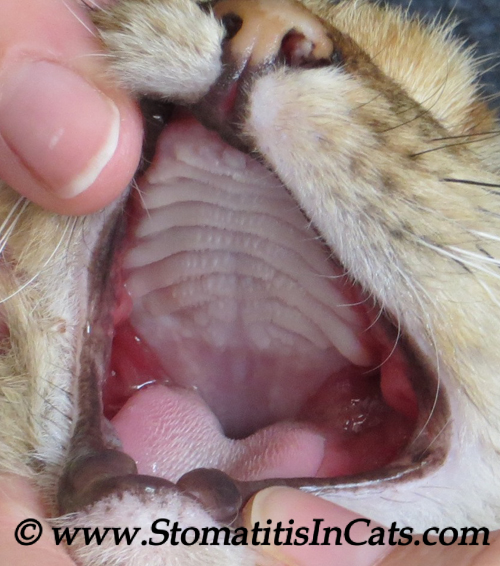
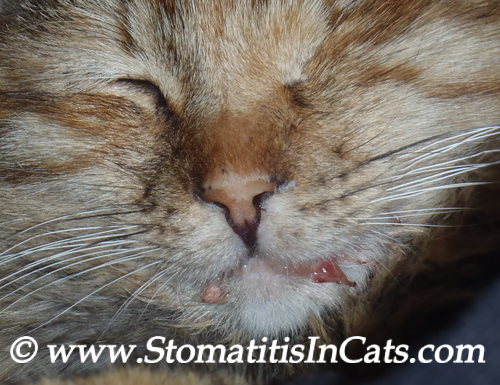
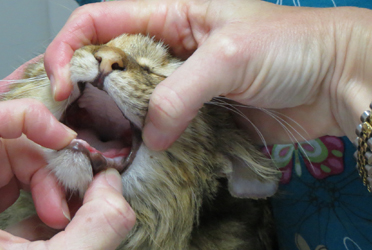
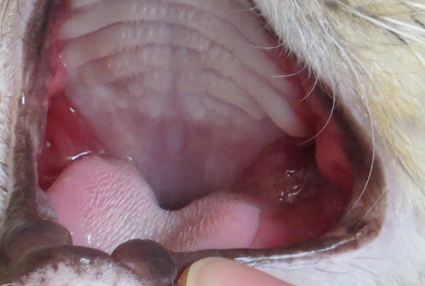
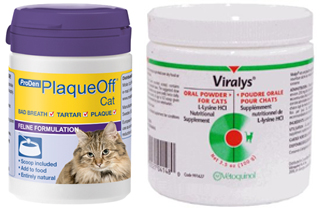
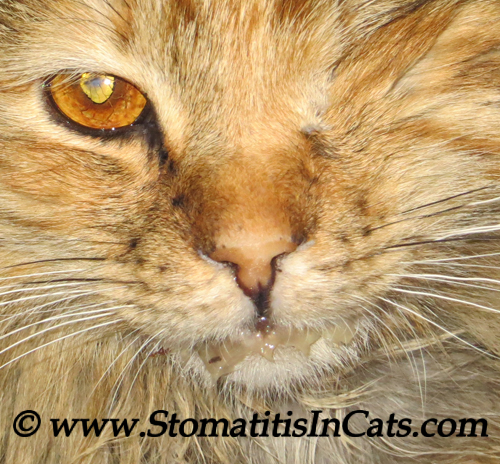







I just adopted a stray older cat from the local humane society and found out she has stomatitis and they did not tell me. She also had a yeast infection in her ear, which they did not tell me, and a respiratory infection which they gave me 3 more doses of medicine for. I am a senior citizen with no savings and, after two visits and shots of antibiotics and steroids, I cannot afford to take Macy to the vet again until I have paid down the emergency credit card. I am feeding her the lysine and plaque-off you suggested. My question is: how long did you treat with antibiotics and the steroid cream? I do not intend to have teeth pulled.
Sara,
I’m sorry to hear about your poor kitty’s health problems. Animal rescues such as the humane society are very stressful for cats (and dogs) and it’s common for them to end up sick with at least one illness. Hopefully the stomatitis can be kept at bay now that you’ve given Macy a loving home away from all that stress.
Lily wasn’t on antibiotics for very long since they didn’t really help the stomatitis. As for the steroid cream, I don’t remember exactly how long she was on it but it was at least a year. I probably could have weaned her off the steroid cream sooner but I was worried that the stomatitis would flare up. Fortunately that hasn’t happened, but I look in Lily’s mouth every couple of months just to make sure it isn’t getting bad again.
I wish you luck finding the right combination to help Macy.
Rochelle
Muffin had her teeth cleaned in Mar 2015 as she had moderate gingivitis. In Oct 2015 she started hiding and stopped eating. Vet said she needed teeth cleaned again and mentioned stomatitis and she had a urinary infection. Teeth cleaned again in Nov 2015, vet not said she only had moderate gingivitis!!! He teeth were fine both times but the gums were inflamed. We her on appetite stimulants when she slows down eating and they really get her eating. She doesn’t look like she is in pain and is not hiding. Taking her to vet again to check her mouth again. If her teeth are good then why would she have stomatitis. Don’t want to have her teeth pulled. She is 11. Maybe will try pain meds and some antibitics and the appetite stimulant. At least she eats good. We started her on lysine in Dec. Any suggestions?
Bonnie,
Sadly, it isn’t teeth that cause stomatitis. It is believed that plaque causes the inflammation of stomatitis, but I understand your concern about not wanting to pull her teeth, especially given her age.
I was able to get Lily’s stomatitis under control by using Lysine, PlaqueOff, and Prednisolone (a steroid cream that we were able to wean Lily off of and she no longer takes). Other people have had luck with silver colloidal water and/or raw food. I know there are a lot of comments on this site, but I recommend reading through them to see if there is anything else that I forgot to mention that has worked for people. I wish you luck in dealing with this nasty disease.
Rochelle
Awesome to hear and thanks for the reply. I live in Canada can I pick up lysine somewhere or does it need to be ordered? And how do you use plaque off? Aren’t they wary about letting you into their mouths especially the one with the sore mouth? My one cat with the inflamed gums gets so angry and claws me pretty bad 🙁
Have your other cats caught the stomatitis? I believe a cat I adopted from a shelter has this and now my other cats have red inflamed gums as well. I am a student and the cost of a full mouth extraction or even constant get bills seems like it’s out of reach..
No, our other four cats have all remained healthy, and they all eat and drink from the same source. I give all five of my cats both PlaqueOff and Lysine and their gums are in great shape. Our oldest cat is 15 years old and she went for her annual checkup two months ago and our vet commented on how good Sasha’s mouth looked.
I have added a forum to this site in an effort to make it easier for people to find and/or share information. I would like to invite you to take a look around and share what has worked for you (or what hasn’t), even if you’ve already shared it here. The forum will be a place where it is much easier to search for and find helpful information.
You can visit the forum here.
I will be posting this comment on all the pages of my site to make sure everyone who is subscribed to comments sees this, so I apologize if you get multiple copies of this message.
Hi Rochelle, your daughter did an excellent job video taping you preparing the supplements for Lily. The kitties are adorable and Lily looked like she was in charge.
I think I should be giving Frankie more of the Lysine and PlacueOff, a larger scoop, or two scoops since Lily is only 6 pounds and Frankie is 11 pounds.
I’ve looked through your website and I can’t find what the steroid cream is that you are giving Lily. I’d like to get our (blue-eyed) Frankie off the Prednisone and the azithromizine now that his mouth is looking pretty good. We want to keep him around as long as possible. He’s a sweetheart. Thanks Rochelle for this website and I know with summer and school being out your time is limited. I really appreciate your help!! Not even the vets have a handle on this affliction.
Miriam,
I’ll be sure to tell my daughter what a good job she did with the video! And, yes, I’m fairly certain that Lily has risen to the position of alpha cat in our house.
The steroid cream that I give to Lily is called Prednisolone. I hate having her on it, but it’s a very low dose. If I ever find an alternative to the steroid cream I will share it on my blog.
Rochelle
My cat Buddy was diagnosed with stomatitis at the age of 3 months. He was a rescue kitten I was fostering and he started to go down hill soon after I adopted him. If I would have known the signs and details of stomatitis before he was diagnosed, that may have changed the way I handled him. Even as a kitten his gums were bloody and inflamed. I just figured because he was so playful he bumped his mouth. First they thought that he had FIV (even though he had been tested once), then FIP (one of his siblings died of this), and then Stomatitis. Over the course of 1.5 years He has had 3 surgeries to remove all of his teeth. The vet thought the best course was to remove the teeth in intervals because some teeth were still solid and the gums surrounding these teeth were not affected. The inflammation was originally just at the back molars. However, the rescue I worked with encounters this all the time and their vet said to remove all teeth at once. Since the second option was close to $2000 and I had qualms about removing all of this teeth, I went with the intervals (the last surgery removed all canines that had rotted out). I was worried about removing all of this teeth because a side affect of removing the canines sometimes is their jaw can be fractured. The canine roots are firmly implanted and are really long and extend into the jaw and I believe upwards into the nasal cavity. In hindsight, I probably should have just done all the teeth at once because I have spent way more money in the long run with multiple surgeries, steroids, antibiotics, pain meds and vet visits. I also had to put my kitten through a lot of stress which broke my heart and has been an emotional roller coaster. I also had the hope that if some of the bad teeth were removed, the mouth would calm down. However, the disease just went on to attack the other teeth. The vet did x-rays to ensure there were no fragments left behind.
I have since seen a “cutting edge” pet dentist regarding my situation. Buddy seems to fall into the small population of still having stomatitis after all the teeth are removed. In his experience it seems that vets performing extractions can remove the pet’s teeth, however, that is not their specialty and then do not have the latest tools. I have to agree with him after seeing multiple vets. He said when removing the teeth they need to “bur” each tooth to ensure the proper size of the root. Thus the root is removed in tact and no fragments break off. Even the smallest microscopic fragment can cause the stomatitis to inflame. Secondly they use another smaller tool after the extraction on each socket to ensure there is no debris. Finally they use a radiograph (different than x-ray) to ensure there are no microscopic particles left. Pet dentists are expensive, but honestly I wish I would have approached them first.
Buddy has used steroid injections and Prednisolone pills which help some but are not extremely affective. I have also had pretty good luck with Atopica which is a medicine that is for inflammation of the gums. However, his mouth seems to still be inflamed. I have used lysine which helps keep his immune system healthy. It does help but does not solve the problem. My next step is to get results from the Pet Dentist to see if they draw any conclusions.
This site is such a blessing and wonderful resource! I am truly sorry for all the pain and heartache you and your family have suffered on this long difficult journey. Not to mention Lily’s pain. She is so lucky to have a caring family like your’s. We never know all of the reasons these precious creatures come into our lives – their trust and surrender to share their lives with another species is absolutely amazing and awe inspiring!
What a beautiful legacy you are assisting Lily in leaving to all of her fellow feline friends and their bewildered well-meaning owners who are searching for answers to this horrible disease. We do not always know how much comfort, love and beneficial information is received just by sharing our heartfelt story and experience.
Thank you for all you have done and for sharing your insightful story and helpful suggestions. LONG LIVE LILY and her compassionate human companions, may you all be well and prosper!
Thank you so much for your kind words! I often wonder if Lily came into our lives because of my youngest daughter. She (my daughter) has chronic health problems, and I think that seeing all that Lily has gone through helps give her strength for what she goes through. Also, she was the one who picked Lily from among all the cats at the rescue group we went to.
I have a beautiful feral that I tamed. He came to me with a broken tooth. I took him to the vet and had the bad teeth removed. That is when Hell broke loose. He eventually had all the teeth pulled. He is quite severe. I did bring his weight up to 12 lbs. I used goat milk, baby meat food and KMS. I pureed everything and he eventually rebounded quite well. After the last surgery, he relapsed again after 10 weeks. We are now using compounded transdermal medications for him. I don’t have to bother his mouth and he receives his meds without fuss. I thought it worth mentioning because I have had him seen by several veterinarians. Only one suggested the transdermal compound. It has been a blessing for us. We take each day one at a time.
Norsee,
I don’t know anything about transdermal compounds. Thank you for bringing this up, in the event that it helps others and their cats.
Rochelle
I found helping hands in Richmond va they provide low cost dental, about $200, surely there are others around the country? I know the cost quoted to me for extraction is out of reach- $1,800.
This is something I have not heard of. Thank you for sharing, so others can look into this in their areas if they are facing a full mouth extraction.
One more question though, is Stomatitis fatal? It worries me, especially since my kitty is otfen unhealthy.
This is a tough question, and there isn’t an easy answer to it, so I will tell you what I know based on my cat Lily.
Lily will turn two years old in August. My vet suspects that she is the result of in-breeding because of her poor health. She lost her eye to glaucoma around five months of age, but glaucoma almost always affects elderly cats. Her one remaining eye is bad. If you look closely at any of the pictures I have listed of her you can see what looks like spiderwebbing in her eye. Right in the middle, where the pupil is, there is cloudiness. We know that she cannot see well as a result of the spiderweb and cloudiness, but we do not know how poor the vision is (you would never know she can’t see well to see her, though – she gets around great!).
She weighs less than six pounds. On a good day she might get up to six pounds even. I just weighed her (I was curious as to her current weight) and she is at 5.10 lbs. right now. In other words, she is a very tiny cat. My vet suspects that her size is all tied together with her health problems because she would be much bigger if she was healthy. And, of course, she has stomatitis.
Most cats respond well to having all their teeth pulled, but Lily was in the small minority that don’t. She still has stomatitis despite having no teeth. We manage her swelling and pain with steroid cream and the supplements I’ve written about. I also give her pain medicine as needed. I initially was just giving her the steroid cream and Lysine, then added PlaqueOff in February. The PlaqueOff has been nothing short of miraculous for Lily, and I took her to the vet for a checkup, hoping that we could take her off the steroid cream. My vet does not want to do that for fear that stopping the steroids will cause a flare-up that will be very difficult to get back under control.
So, Lily will be on a low-dose steroid cream for the rest of her life. The problem with that is that it will most likely cause diabetes at some point. If/When that happens, it will be the end for Lily. Please forgive me for not remembering the specific details, but my vet explained that the treatment for diabetes cannot be given with steroids. So, we would either have to treat the stomatitis or the diabetes, but not both. Not treating diabetes will be fatal. Will not treating stomatitis be fatal? Possibly, but indirectly. Stomatitis itself would not kill Lily, but if her gums and throat get too inflammed and painful, she will stop eating and drinking. That will be fatal.
From what I have learned, stomatitis is different for each cat. Meaning, the severity is unique to each cat. Some cats will respond very well to treatments and the stomatitis will clear up. Others won’t, such as Lily, but the stomatitis might be controlled, such as it is with Lily with steroids and supplements.
I wish I could give you a better, or at least optimistic, answer, but it really depends on the cat. In our case, I am pretty sure that Lily will not be with us for very long. I have told my children to love her for as long as we have her because she will probably be the first of our five cats to pass away. I have shed many tears over this, but I wouldn’t trade Lily for the world. She is here for a reason. My husband has said many times that he thinks we saved her life because many other people would have had her put to sleep after finding out about her stomatitis. I suspect he is right, though I also know that the pet rescue society we got her from would have never put her to sleep for this. On the flip side, Lily was living in a house with about 70 other cats when we adopted her, which is stressful for sickly cats and often leads to a shortened life. So he may have been right in more ways than what he thought.
I wish you and your kitty luck as you deal with your own stomatitis situation.
Rochelle
I just found out on Tuesday that my 2yr old cat has advanced stomatitis and they want to remove all of her teeth next week. I got her as an abandoned kitten at a construction site and she never tamed up. The vet had to sedate her to give her shots this week which is how they found the stomatitis. I will only have two weeks with her at home before I have to leave town for a full week (I have a friend coming over while I’m gone.) I would like to wait to do the surgery until I get back but they want to do it right away. My concern is in recovery time and how she is going to eat.
How long did it take for Lily to recover from surgery and what do you feed her? Also because I cannot handle my cat, I won’t be able to do any kind of creams. My vet quoted me $700-$900 for sedation and surgery, does that sound about right depending on how long it takes?
I’m so sorry that your cat has advanced stomatitis.
Regarding the price for the surgery, your estimate is about half what we paid for Lily’s extraction. I suspect that the cost will vary based on location, so that might be right for where you live. Since the cost is so different from what I paid, you could contact your local cat rescue society and ask them if this figure sounds right. They are also an excellent resource for finding out which vets are the best to go to for procedures like this. They have to deal with vets on a regular basis so will have insight on who is good and who isn’t. That is what I did after Lily was diagnosed with stomatitis, and the vet we go to now is one that my local cat rescue society recommended.
The one thing that is absolutely critical when teeth are pulled is to make sure your vet will do x-rays after the teeth have been removed to make sure there are no tooth fragments left in the gums. Be sure to ask about this before the surgery. You can even ask that they provide you with photos of the x-rays. That’s what I did, and when I get the chance I will post them on the site so others can see what they look like.
As for recovery time, Lily had to stay away from any form of dry cat food for 10 days. From what I recall, that was really the only thing I had to do. This was tough for me because I have four other cats who eat nothing but dry food. If you only have the one cat than that will be easy. In my case, I had to keep Lily in our bathroom for the entire 10 days because she REALLY wanted the dry food, but eating it could have torn her stitches.
Now Lily eats dry food and loves it. I have learned that cats don’t have to chew their food. However, to keep her from choking, I feed her Iams which has small kibbles. She eats them one at a time by tossing them to the back of her throat and swallowing them. Cats eat surprisingly well without teeth.
Cats with stomatitis shouldn’t really have wet food, which seems contrary to what you might think. The reason wet food should be avoided is because cats have to use their tongue to eat it, which requires the use of muscles that run through the throat (I might have the anatomy wrong, so please forgive me if this isn’t quite accurate). The bottom line is that eating wet food causes them pain in their throats because of how they use their tongues to eat it. I only give Lily a small amount of wet food in the mornings and at night to give her Lysine and PlaqueOff.
Hopefully your cat will be symptom free after the surgery, but be aware that it takes about six months after the tooth extraction to know if the surgery worked. Stomatitis is very slow to heal. What you might consider doing after the surgery is starting your cat on both Lysine and PlaqueOff (do not give PlaqueOff if your cat has hyperthyroidism). You can talk to your vet about both of these supplements if you are unsure about them.
Much luck to you and your cat.
I’ve already spent $2,000 on my cat with stomatitus. Did you spend thousands on Lily? I cannot do more.
Yes, we spent over $2,000 on her surgeries and care. We would have never adopted Lily had we known what she had, and there were times when I hid the costs from my husband because he was terribly stressed out by the cost of her care.
The good news is that the worst of her expenses appear to be behind us. The most expensive part of Lily’s care was having her teeth removed. Now we spend $39 a month for her steroid cream, and I also keep a pain medicine on hand for when she drools which costs $18 for a handful of doses. I don’t need them much these days, so an $18 batch of Buprenex lasts for several months.
I also buy two supplements that cost $15 (for Lysine) and $30 (for PlaqueOff). The Lysine container lasts for quite a few months, and the PlaqueOff lasts for between 9 and 12 months. These two come to about $5 per month.
If you add all this together, we now spend about $47 a month on her medicine. I have only had to take her to the vet once this year, and it was a checkup, not an emergency visit, so I am not spending much on vet visits now. Last year (2012) was insane with the number of times I had to take her to our vet, but that was before I knew about and started her on PlaqueOff.
I just published a review of PlaqueOff, which I think is a miraculous product when it comes to treating stomatitis. If your cat does not have hyperthyroidism, then I strongly encourage you to read my review at . I have included photos of Lily’s stomatitis and how it has improved after taking PlaqueOff so you can actually see how helpful it has been for her.
Please feel free to ask any more questions that you have. I have been where you are right now and know how stressful and difficult it is for both you and your cat. I’m so sorry that you are both going through this.